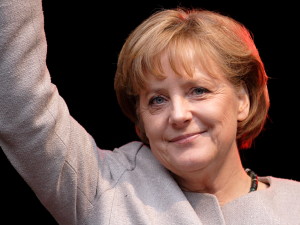Merkel Alone in Refugee Crisis
In his role as a United Nations Messenger for Peace, George Clooney met with German Chancellor Angela Merkel on February 12 to express his support for the Chancellor’s refugee policy. Although Clooney’s official backing benefits Merkel, many of her critics have noted that the fact that she met with an actor in the first place demonstrates just how precarious her political position has become. As Die Zeit explains, one of the central pillars of Merkel’s refugee policy—the demand that all European nations accept a certain quota of refugees—has left Germany isolated in the face of growing opposition from European Union member states.

Merkel’s unwavering demands for a European solution to the refugee crisis have come at a considerable cost. Germany now stands alone against other European nations, which will not acquiesce to the Chancellor’s calls for a quota system. While British diplomats argue that charity is not a viable solution, France’s Premier Manuel Valls claims that Europe simply cannot accept any more refugees, reports the Süddeutsche Zeitung.
Hans Kundnani, a Senior Transatlantic Fellow at the German Marshall Fund, points out that even Central European countries that usually support Germany due to economic interests chose to oppose the Chancellor’s calls for refugee quotas. According to Kundnani, their opposition suggests that Germany “lacks either the legitimacy or the capacity to get other Europeans to accept its lead.”
As political opposition drives a wedge between Germany and the other members of the European Union, many have questioned why the Chancellor assumed such a firm stance in the first place. One argument is that she recognized the German people’s need for her guidance.
Hans Kundnani explains that Merkel’s approach to the refugee crisis, like her approach to many other issues, is to “wait until she can perceive a shift in public opinion, and only then act decisively.” Indeed, for a long time Merkel delayed taking a bold stance on the refugee crisis. According to Der Spiegel, the Chancellor finally took a clear position in August 2015, when violent xenophobic riots in Heidenau sparked a media firestorm that criticized Merkel for doing too little to support refugees. As she condemned these hate crimes in the midst of growing tensions, the need to find a solution to the refugee crisis became ever more pressing.
To oppose Merkel’s persistent demands to accept more refugees, European nations have had to unite against her. However, Merkel maintains her principled stance. An article in Die Zeit suggests that Merkel would resign as Chancellor rather than agree to close Germany’s borders.
This threat represents a strategic, albeit risky, political game; Merkel expects that once other European Union member states recognize the consequences of losing her leadership and the inhumanity of closing Europe to refugees, they will finally cooperate with her demands. Whether Chancellor Merkel maintains her hardline policy and whether her fellow European Union leaders acquiesce remains to be seen.
Note: This article appeared in an abridged format for print on February 23, 2016.
